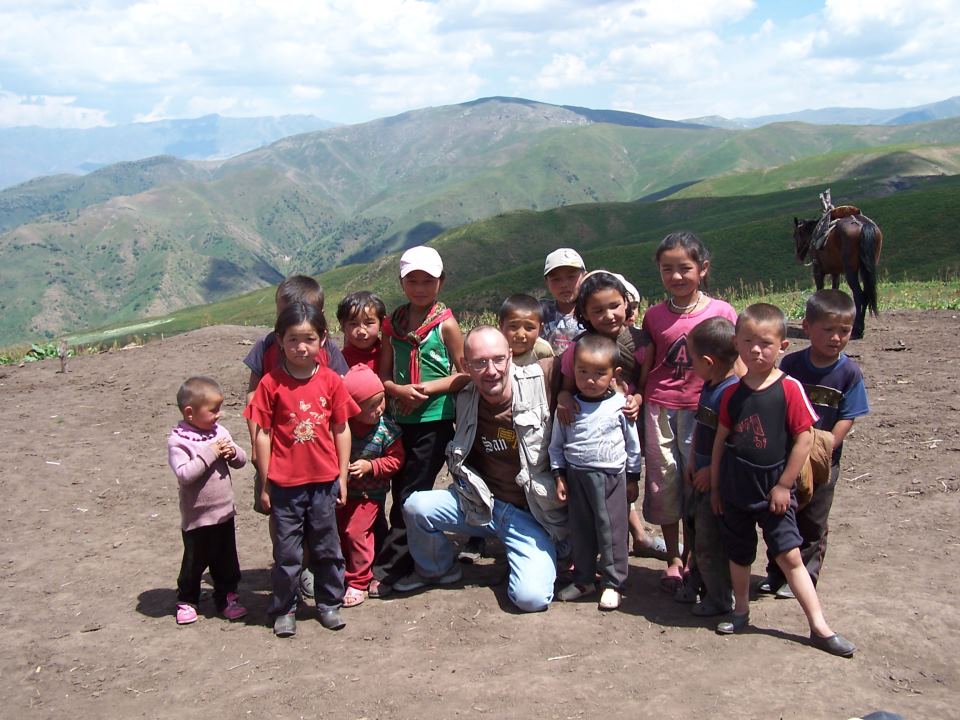
Igor Rotar, a former correspondent for Russian media outlet Nezavisimaya Gazeta, has worked extensively in Central Asia. Here he poses with children in Kyrgyzstan. Photo taken from Rotar's Facebook. Used with permission.
This post by Russian journalist Igor Rotar was originally published in Russian on Rosbalt.ru and translated into English for Global Voices by Olga Dmitrieva. It is part of our campaign #FreeAlexSodiqov: GV Author Detained in Tajikistan.
The detention of Alexander Sodiqov, a young Tajik researcher accused of spying by the Tajik authorities but who was in fact just carrying out sociological fieldwork in Gorno-Badakhshan under a contract with the U.K.'s University of Exeter, has sparked outrage among scholars, journalists and human rights activists. More than 30,000 signatures, including those of Western and Russian researchers, have been collected in support of Sodiqov. Nearly all known international organizations have stood up for him and articles noting the arbitrary behaviour of Tajik security chiefs have appeared in the most prominent American, Canadian and British newspapers.
However, what is most important for Russians is not even the absurdity of this situation but the fact that the Tajik precedent is likely to play out in their country as well, because it is fully correspondent with ongoing Russian trends. In Russia there have been several cases where scholars were convicted for passing publicly available data on to foreigners. The recent Russian Foreign Agents Law, too, offers major opportunities for espionage accusations. Now if some organization like “Memorial” is gathering facts about human rights violations in the North Caucasus, while working on Western grants, it may well be interpreted as espionage on behalf of a foreign government.
Foreign researchers who have called for release of their colleague also point out an indirect connection between Sodiqov’s case and Russian realities. Edward Schatz, an associate professor of political science at the University of Toronto and the supervisor of Sodiqov’s doctoral work, reasons:
As NATO forces leave Central Asia, Canada and the West should not leave Tajikistan to Russian influence, if that influence means authoritarian abuses of power and deepening kleptocracy. We need to partner with those who seek to minimize abuses and who hold states like Tajikistan to their obligations under international law. Unless and until Russia becomes that kind of partner, we need to be wary about its influence.
The Tajik precedent may well affect journalists, too. Here is the official press release of the State Committee for National Security in Gorno-Badakhshan Autonomous Region:
Предварительная проверка показала, что Содиков 9 июня по электронной почте был приглашен на встречу с представителем одного иностранного государства. Встреча состоялась 10 июня сначала тет-а-тет с переписчиком, а вечером — в резиденции с первым лицом спецслужбы иностранного государства, который работал под дипломатическим прикрытием. От последнего он получил конкретное задание и денежную сумму для его выполнения. В ходе встречи в Душанбе гражданину А. Содикову было поручено выехать в город Хорог и с соблюдением мер конспирации встретиться с гражданином РТ Алимом Шерзамоновым и заполучить у последнего сведения разведывательного характера по заранее подготовленному вопроснику.
Preliminary inspection showed that Sodiqov was invited by email on June 9 to meet with a representative of a foreign state … The meeting was held on June 10 this year, firstly face-to-face with notes taken, and then in the evening at the residence of the main representative of a foreign secret service working under diplomatic cover. He was assigned a specific task by the said person and a sum of money to complete it. During the meeting in Dushanbe, A. Sodiqov was requested to go to the city of Khorog as part of a conspiracy to meet a Tajik national, Alim Sherzamonov, and gather information of an intelligence nature from the latter by means of a pre-prepared questionnaire.
When this information is translated into a normal language, it runs as follows. A British colleague of Sodiqov, political scientist John Heathershaw, invited the Tajik scholar to meet him in Dushanbe. After the meeting both researchers went to a dinner at the British Embassy. The British ambassador tried to dissuade the British professor from going to the Pamirs because of the tensions there. Then John Heathershaw offered Sodiqov the opportunity to conduct a sociological survey in the region.
Umed Babakhanov, a famous Tajik journalist and editor-in-chief of Tajikistan's Asia Plus news agency, notes that he escaped the “spy fate” of Alexander Sodiqov by a miracle. It was just by chance that the journalist did not attend that dinner at the British Embassy in Dushanbe, and, what is more, he subsequently met John Heathershaw. So Babakhanov makes the following ironic comment:
После всей этой истории я задаю самому себе вопросы, на которые не знаю ответов: если бы я в тот день пошел на ужин в резиденцию посла, считался бы я тоже шпионом или пособником шпионов? Считаются ли таковыми другие таджикские ученые, которые пришли в тот вечер на «секретную встречу»? Если социал-демократ Алим Шерзамонов, с которым встречался Содиков, является носителем «сведений разведывательного характера», то являюсь ли таковым я? Если да, то не выдал ли я ненароком во время нашей встречи с британским ученым каких-то государственных секретов?
Ever since this saga began, I have been asking myself questions to which I do not have answers: if I had gone to dinner at the ambassador's residence on that day, would I too have been considered a spy or a spy's accomplice? Are other Tajik academics that also attended this “secret meeting” that evening also considered spies? If the member of the Social Democratic Party of Tajikistan, Alim Sherzamonov, who was meeting with Sodiqov [at the time of his arrest], is a carrier of “information of an intelligence nature”, am I also a carrier of such information? If so, did I inadvertently, during our meeting with the British academic, give away state secrets?
As for me, I am also deeply concerned about my chances of becoming a spy. I regularly wrote articles for Western political science foundations, delivered lectures at various U.S. Soviet studies and human rights centers and even worked (fortunately, not for long!) for Radio Svoboda, famously funded by the CIA [Editor's Note: Radio Svoboda is funded by the U.S. federal agency Broadcasting Board of Governors]. Moreover, I admit to having been in contact with foreign diplomats. Not only did I attend receptions at many embassies, but also advised Japanese and Polish diplomats when geologists from Japan were seized in Tajikistan and when Polish journalists were taken hostage in Chechnya, respectively. So, following the logic of the Tajik authorities, I am obviously a super spy.
I believe there are other Russian journalists that can say the same thing about themselves. Most interestingly, those foreigners who would like to obtain information from journalists might indeed turn out to be secret foreign intelligence officers. However, I had no worries before the Tajik precedent because unless you divulge sensitive information, you don’t do anything blameworthy. But, as this Tajik story tells us, everything can change in a moment. New realities mean that in order to be completely protected against espionage accusations, it is better to eliminate any possibility of contact with foreigners.
We have already been there, during Stalin’s time.







